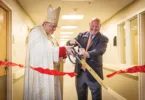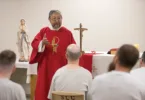Confession is our way to peace, says Archbishop Keleher
by Joe Bollig
joe.bollig@theleaven.org
KANSAS CITY, Kan. — Although he had been well prepared by the Sisters at his Catholic grade school, going to confession made Jimmy a bit anxious.
“It was in the box,” he said, remembering his youth. “The slide [window] would open and you’d confess. You didn’t want to forget anything, and you hoped [the priest] would treat you kindly — which he always did. You’d hear these stories, but all I experienced were very good priests.”
It was all very serious and slightly mysterious — a typical experience for a Catholic kid growing up in the 1930s.
Boy meets sacrament
Jimmy never stopped regularly going to confession. He became a young man, and then a priest, and finally a bishop. Today, people know him as Archbishop Emeritus James P. Keleher.
Not only did the Sisters in school teach him about the importance of the sacrament, his parents also set a good example.
“My parents were very careful about regular confession for themselves as well as their children,” said the archbishop. “My father, every month before Holy Name Sunday, would go to confession so he would be better prepared to receive the Blessed Sacrament.”
Attitudes about the sacraments then were very different from what they are today. Many people did not receive the Eucharist but, when they did, they often went to confession first. Many went monthly, and several went weekly for “devotional” confessions.
“It’s not that they were in serious sin at all, but just their respect for the Eucharist was such they felt that confession would be the appropriate way to receive the Sunday sacrament,” said the archbishop.
The young confessor
His respect for, and appreciation of, the sacrament of reconciliation increased through his own experiences as a chaplain to Catholic orphans and congregations of Sisters, as well as his own parishioners.
“I learned it was very important to be a gentle shepherd when I was dealing with the person on the other side of the screen,” he said. “When they left the confessional, they said, ‘Thank you, Father,’ and I think they felt a burden had been lifted from their shoulders. It was a consolation for me.”
As a young priest, Archbishop Keleher tried to help young couples become established in regular practice of the sacrament of reconciliation.
“If I had a wedding on Saturday, I would be at the practice on Friday night,” he said. “When the practice was over, the first thing we did was go back to the confessional — not only the bride and groom, but the attendants and groomsmen.”
He didn’t give them a choice.
“I’d tell the couple, ‘I’m going to hear your confession,’ not ‘Would you like to go to confession?’” said the archbishop. “I’d tell them, ‘You should not receive this beautiful sacrament without having confessed.’”
Use it or lose it
Catholics may not frequent the sacrament of reconciliation the way they did in the past. Archbishop Keleher thinks this is due, in part, to the rise of a more secular age in which we live. We have lost a sense of sin.
He has cause for hope, however, in the young.
“When I go to [the archdiocesan] Camp Tekakwitha — I must admit, that’s a culturally Catholic place — I love it when I’m asked to hear confessions of their wonderful young staff or the campers,” said Archbishop Keleher. “I tell you what: Almost all the young people go. They love to go. They have no problem with it at all. I hope they keep it up.”
Unfortunately, many young people do not keep up the practice of regular confession. Apathy and absence can carry a person further and further away into spiritual peril.
“I’m always afraid if [someone] doesn’t go for a year or two, they then begin to think, ‘How can I ever go again?’ And they don’t go,” said the archbishop.
That’s why, after he would hear the confessions of young couples getting married, he would ask them to make a pledge: Try to go to confession monthly, but at the very least go to confession at Christmas and Easter.
“If they go at least twice a year, there’s a chance — as they develop their faith — they will go more frequently,” the archbishop said. “But if they don’t go at least twice a year, they aren’t going to do it.”
“It’s the ones who have missed two or three years that I worry about, because they won’t come. They’re afraid to come,” he added.
Whenever he encounters someone who has been away from the sacrament for a long time, he tells that person, “Don’t worry about it. I’ll walk you through it.”
The resurrection sacrament
The sacrament of reconciliation may be experiencing a revival, thanks in part to the efforts of the late Pope John Paul II, said the archbishop.
“One of the great contributions of Pope John Paul II was to try to make people aware of the power of the sacrament — not only to forgive serious sins, but as a way to stay closer to Jesus,” said Archbishop Keleher.
There is an important reason why confession and the Eucharist are linked, he said. They’re both fruits of the cross of Christ.
“This sacrament is a gift of the cross,” he said. “By the cross of Jesus and his precious blood, and by the offering of his sacred body, Jesus has given his church the Holy Spirit for the remission of all our sins. It’s a beautiful thing.
“That same Holy Spirit that forgives our sins is also the eucharistic gift, because it’s through Jesus’ cross that the Spirit comes in at the words of the priest at the consecration; the bread and wine become the body and blood of Christ through the power of the Holy Spirit.”
There are two things that all saints know — and that helped them become saints, said the archbishop. One is that we are gifted by God with eternal life. The other is that although we are sinners, we can be forgiven.
“It’s a ‘felix culpa,’ a ‘happy fault,’ as we say on Holy Saturday,” said the archbishop. “It’s a happy fault because we are forgiven. We are his creatures, and we are grateful; we are sinners, but we are forgiven.”
“I think it’s a shame that people will allow themselves to go through years without utilizing this beautiful sacrament,” he continued. “And when they do that, they are in danger of carrying on their shoulders burdens of guilt that could easily have been taken care of with this sacrament.”
What the world needs today is peace, and that will not come without forgiveness, said the archbishop. It must begin with us asking us God for forgiveness, and then forgiving others to establish peace in our relationships.
“There will never be justice without forgiveness,” said Archbishop Keleher. “This beautiful sacrament is a wonderful way Catholics can find that peace.”






